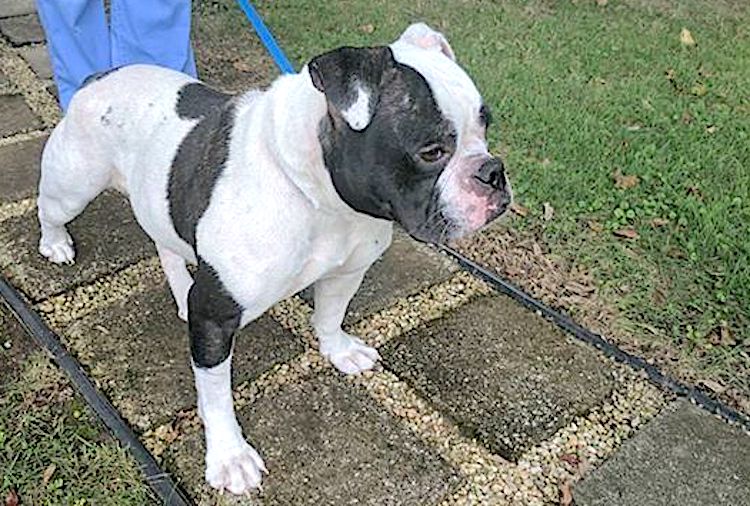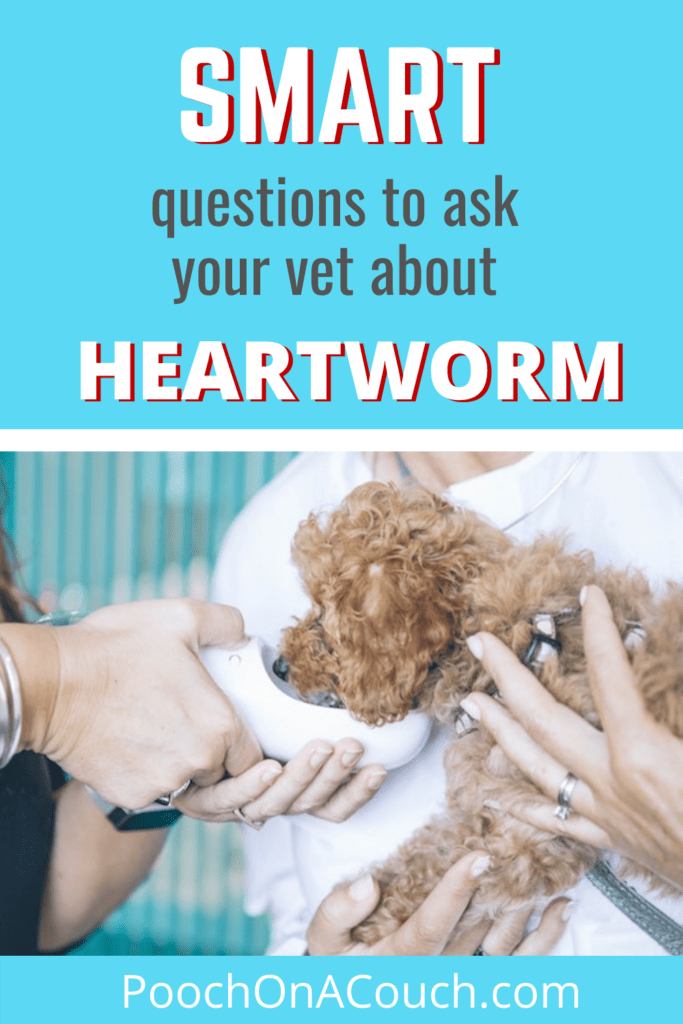“Your Dog Tested Positive for Heartworm”
“Heartworm positive” is one of the most frightening diagnoses a pet owner can hear. If you’ve recently learned your dog is positive for heartworm, you are probably feeling overwhelmed. You have a ton of questions, don’t you? I can help you identify questions to ask your vet about heartworm.
You might feel guilty as well, blaming yourself for your dog’s diagnosis. Don’t. I encourage you to take any of those feelings and direct them toward getting your dog well. heartworm is a complicated disease. Heck, the way a dog becomes heartworm positive is complicated. Even the most rigid prevention protocol can fail. For sure, heartworm is a sneaky, sneaky parasite.
You are where you are, and I want to help you be the best advocate for your dog going forward.
I’m going to try and provide you with a fairly comprehensive list of questions you might ask your veterinarian as you prepare your dog for heartworm treatment.
If you have a question that I haven’t included, please write to me and tell me about it so I can include it for future readers.
I am not a veterinarian nor an animal behaviorist. I present my understanding of health or behavior issues based on personal experience and research I’ve done. If you have a dog with a health or behavioral issue, seek professional guidance. I hope you find my post useful.
Depending Upon Details, You May Be Familiar With Heartworm!
In rescue work, (particularly in the south) we are not quite as shocked when we hear the diagnosis “heartworm positive”. In fact, we are more shocked when we rescue a dog that tests negative for heartworm! I’m so familiar with some endemic pockets in Alabama, if a dog I rescue from there get a negative testing, I celebrate it in some way.
We see heartworm a lot.
As a repeat foster home for rescued dogs, you will eventually be asked if you want to foster a dog through heartworm treatment. If you say yes, I know you’ll have a lot of questions and will be a bit worried. I want to help.
I’ve fostered several dogs through heartworm treatment and coached scores of foster moms and dads who were fostering dogs through heartworm treatment. Most dogs sailed through treatment without any complications at all. A few – I could count them on one hand – developed complications either due to medication intolerances or…. failure to follow the veterinarian’s recommendations for exercise restrictions and confinement. I’ll get to that in a little bit.
In thinking about all of those cases, and in remembering conversations I’ve had with others outside my rescue agency, I thought it might be helpful if I developed a list of questions that you might want to ask the veterinarian that is treating your foster dog. Questions to help you better understand why your dog is on the protocol they are on, and questions that will help you give your foster dog the best shot at shedding these awful, ugly worms!
I’m going to base my list of questions on the American Heartworm Society’s (AHS) 2020 guidelines, but I will pepper in questions that will help you care for your foster dog that may be treated using a different protocol or variant protocol.
I’ll break the questions up into four sections:
- diagnosis and treatment plan
- pre-treatment
- treatment
- post-treatment
If there’s one thing I’ve learned about heartworm treatment is that, over time, veterinarians skilled in heartworm treatment have found nuanced adjustments to the AHS guidelines. There are many ways to successfully and safely help a dog shed heartworm. But the heart of the AHS protocol is always the Immiticide (Melarsomine/Diroban) injections.

Questions To Ask Your Vet About Heartworm Diagnosis and Treatment Plan
According to the American Heartworm Society (AHS), diagnosing and staging Heartworm includes 4 steps:
- A heartworm test and a second test to verify results.
- The clinical evaluation: physical exam + symptom report
- Chest (heart and lung) radiographs
- Bloodwork/Urinalysis
All four of these steps will help your veterinarian determine how advanced the disease is in your dog. This is usually called “staging” heartworm disease. There are 4 stages of heartworm.
Ask Your Vet These Questions…
- Which diagnostic test(s) did you use on my dog to diagnose heartworm and help you formulate your treatment plan? Why did you choose those tests? Is this the best test available?
- Do you recommend radiographs and/or bloodwork and urinalysis? Why or why not?
- What stage of heartworm disease do you think my dog is in and why do you think that?
- Which protocol are you prescribing? Why have you chosen this protocol? Is it different than the AHS’s guidelines? How? Why?
*Important Note! Just because a veterinarian veers from the AHS current guidelines does not mean they are not practicing best medicine. That said, you do want the vet to be able to articulate to you why they’ve chosen their preferred protocol above the AHS current guidelines. Do not be afraid to ask your veterinarian about heartworm decisions for your dog!
Questions To Ask Your Vet About Heartworm Pre-Treatment
If we think about heartworm treatment as meaning the Immiticide (Melarsomine) injections, then pre-treatment is the part of the protocol that prepares the dog for the injection phase.
Pre-treatment starts (or usually starts) the day the dog is diagnosed with heartworm. (Note: to be accurate: pre-treatment is TREATMENT. I’m just trying to break up this complicated protocol into digestible bits)
What Is Heartworm Pre-Treatment?
Pretreatment is preparing the dog to receive Immiticide (Melarsomine) injections. Pre-treatment usually includes the following basics according to the American Heartworm Society:
- A dose of heartworm preventive
- A prescription for Doxycycline
- A prescription for Prednisone
- Directions to begin exercise restriction
Based on your dog’s clinical picture, your veterinarian may add to this list or they may choose to not use all of these listed. Ask your vet about heartworm treatment in their clinic and how it differs from the AHS guidelines or why your dog will benefit from their adjusted protocol.
Your vet will almost always want your dog on a monthly heartworm preventive every month during heartworm treatment. Ask your vet about heartworm prevention and which prevention product they will prescribe for the course of your dog’s treatment.
Ask Your Vet These Questions…
- Do I need to restrict my dog’s activity? How much restriction?
- What can my dog do and not do?
- Are leash walks OK?
- What activities are off limits?
- What happens if my dog accidentally runs, has a zoomie, or gets excited?
- What should I do if I cannot keep my dog calm as you suggest?
- Will my dog be prescribed Prednisone? What does that medication do? Please list all the side effects my dog might have with this medication and how I can help my dog cope.
- Will my dog be prescribed Doxycycline? If not, why?
- If yes, I understand there are side effects my dog might experience. Please review these with me and how I can help my dog cope.
- I understand that in rare cases, my dog may develop an intolerance to this medication or develop a more serious side effect. Please tell me what symptoms to look for and what to do.
- Are there any other symptoms I should keep an eye out for?
- Which heartworm preventive do you recommend I use during the heartworm protocol?
Questions To Ask Your Vet About Heartworm Treatment
The treatment phase is the injection phase. If the AHS guidelines are being followed, the injection phase is about 60 days in duration: 1 injection is administered followed by 30 days of confinement after which two injections, administered 24 hours apart are given, followed by another 30 days of confinement.
The injection dosage (Immiticide, Melarsomine, Diroban) is weight driven and the medication has a very short shelf life. This explains why price for the treatment can vary widely from dog to dog. Unused medicine is disposed of same day.
The injection is administered in the lower back area, deep into the muscle. It is painful, and the dogs often experience soreness and pain the night of the shot. Most dogs begin to feel less pained the second day. Pain can be greatly diminished with a good pain management plan.
You will likely have some anxiety that will creep up as you approach the day of the first Immiticide injection. Ask your vet about heartworm injections.
Ask Your Vet These Questions…
- Will my dog be sedated for the injection? If so, do I need to keep my dog NPO (nothing by mouth) the night before?
- I understand the shots can be painful and make my dog sore and uncomfortable. How do you minimize the discomfort? Do you do any pre-treatment for pain? Will you do laser treatment on the injection site?
- Will you send me home with pain medication? Why or why not? Which medication do you prefer to use?
- What else can I do to help my dog’s pain after the injections?
- What activity restrictions are needed now? Be specific! What can my dog do and not do?
- I understand my dog may cough sometimes. How do I know if the cough is expected or serious and needs medical attention?
- What other side effects should I watch out for?
- If my dog becomes symptomatic outside of office hours, is there a way to reach you by email, text, or other messaging services (like Facebook)?

Questions To Ask Your Vet About Heartworm Post-Treatment
Treatment is all done! You still have questions, right!?
After shots 2 and 3, you’ll want to know when your veterinarian wants to see your dog in the clinic again, barring any unscheduled visits for concerns. Some vets will ask to see your dog at the end of the 30-day wait period, others may have a different schedule or may not want to see your dog until the recommended time for heartworm testing, 9 months later.
Waiting is hard!! You want to know how long you have to wait for the news that the treatment worked, or didn’t.
Questions To Ask Your Vet…
- When do you want me to bring my dog back to you for a check-up? What will you do during that visit?
- When will you re-test my dog to see if the treatment worked? What happens if my dog tests positive at that time? What will your recommendations be?
- What test will you use to check if my dog is now heartworm negative? Why do you choose this test?
- What is the microfilaria test and how important is it?
- When can my dog begin to come off of activity restrictions?
- How do you advise me to re-introduce activity into my dog’s daily routine? Can you give me examples?
- Are there any risks for complications post-treatment?
- Why hasn’t my dog’s cough gone away?
- How can I provide the best care to my dog going forward so that I minimize the chance of re-infection of heartworm? (A question we all know the answer to, but I include it here because we all live in different areas of the world and heartworm may be different in your briar patch. A product you used last year may now be a second-choice product. It is always wise to review your products with your veterinarian.)
Questions To Ask Your Vet about Heartworm Complications
I belong to a social media support group for heartworm treatment. Nearly everyone’s dog coughs at some point during the treatment. One of the most frequent questions there is: How do I know if a cough is serious or not? The second most frequent question is, “My dog is panting. What should I do?”
It is so important for your veterinarian to provide you with some guidelines on medication side effects as well as what to watch for and what to do in the event of an emergency. So ask for it!

Is A Rescue Paying For Your Dog’s Treatment? Questions To Ask
Do you have a heartworm positive dog whose treatment is being managed by a rescue agency or an animal shelter?
If so, it is not unexpected for you to have a pared-down treatment plan. I wish more rescue agencies followed the AHS guidelines when appropriate, but I understand cost is prohibitive and rescues rely on donor dollars. Hopefully one day, all will have the resources they need.
This could mean that your dog isn’t “staged” using radiographs or bloodwork. It may mean that your dog isn’t prescribed some of the medications listed above. Or, it may mean that your dog isn’t on a pain management plan. Maybe your dog doesn’t get injections at all, (slow-kill) or maybe gets a different injection schedule altogether.
- If your dog is going to receive injections, do ask the treating veterinarian if your dog is going to receive pain medications. If they say that the rescue agency hasn’t authorized this, ask if you can pay for the medication yourself. These shots are painful and cause deep muscle soreness.
I also advocate for the dog to receive pre-treatment pain medications before the shot is administered. The comfort of the dog post injections is so much better with a good pain management plan.
I’ve done this many times; most veterinarians are accommodating when it means good care for the dog.
A vast majority of rescue agencies may not have funds earmarked for heartworm diagnostics such as radiographs or lab work.
- At best, I would ask the treating veterinarian if getting those tests would help that vet formulate a more tailored treatment plan for your dog, and if so, how. Go back to the rescue agency and see what they say, ask them to approve these tests for your dog. As a last resort, offer to pay for those diagnostics if you can.
- If the treating veterinarian thinks that the 3-shot protocol is optimal for your dog and the rescue agency is only paying for the 2-shot protocol, ask if you can pay for the 3rd shot. Yes, it adds an additional 30 days to the treatment plan, but if the vet thinks 3 shots is better for your dog, then take the opportunity to negotiate for an alternate plan.
Ask your veterinarian about after-hours availability for questions once your dog begins the protocol. There is no worse feeling in the world than to see your dog cough at 9 o’clock at night on a Friday and worry that your buddy is possibly in trouble. Ask them if they have Facebook messenger, or email or text or any other way you can get access to them. Some veterinarians are available this way for brief help. Ask them too, where they recommend you go if your dog needs emergency care.
Questions To Ask Your Vet About Slow-Kill Treatment
Slow-kill treatment for heartworm disease is a disease management protocol that does not include Immiticide (Melarsomine) injections.
Originally, it was used as a stop-gap treatment intervention when a severe shortage of Immiticide prevented veterinarians from being able to treat dogs for heartworm.
Slow-kill basically works to prevent any heartworm larvae from maturing into adult heartworm while waiting for the existing adult heartworms to complete their lifecycle. There is some evidence that medications given during slow-kill shortens the life of the adult heartworm. Still, it can take up to two years for a dog to shed all of the adult heartworm.
Many dogs test negative for heartworm within a year using a slow-kill protocol. Some dogs take longer than two years to test negative and your vet may discuss switching your dog to a fast-kill protocol.
Slow-kill may be the only option for you. And that is OK! Scientists continue to study the efficacy of slow kill protocols.
Questions To Ask…
- Is slow-kill an appropriate treatment option for my dog?
- Which slow-kill protocol do you use and why?
- If I choose to use a slow-kill protocol, how long should I follow this protocol before we decide it is not working for my dog?
- Is slow-kill safer for my dog? Why or why not?
- I’ve been told that slow-kill treatment is easier on a dog. Is that true?
- Can my dog still remain active while on slow-kill? If not, what specifically can my dog do and not do?
- What complications might my dog experience while on slow-kill? What symptoms should I watch out for?
- Why does the American Heartworm Society and the AVMA prefer fast-kill over slow-kill for treating heartworm in most dogs with the disease?
A word about “all natural” or holistic treatments for heartworm
There is a difference in “natural” treatment for heartworm and good, supportive supplements for your dog while they are undergoing treatment. There are plenty of websites that talk about or promote the use of natural or holistic treatments for heartworm. Please, talk to your vet before you choose to purchase a natural remedy for heartworm.
Even my veterinarian who is well versed in eastern and holistic veterinary medicine relies on the fast kill and slow kill protocols to treat her patients.
If you want, ask your vet if they are aware of any good supplements they would recommend and which to definitely not use with your dog.
Finally, Ask Your Veterinarian About Heartworm
As a former administrator for a dog rescue agency, I’ve helped guide over 100 dogs through heartworm treatment. Only a handful stayed with me, all the rest were in different foster homes. But it was my job to help educate and guide everyone as safely as I could through each and every treatment.
Over 90% of the time, we were using the AHS guidelines of the time, with the rest needing slow-kill for various reasons. Of those dogs on fast-kill, only a small handful developed complications that were either drug intolerances or failure to provide appropriate activity restriction (resulting in an embolism.) One or two developed complications related to disease advancement, but were treated and completely recovered.
Having information on the ready gave my foster homes the confidence they needed to get through 120 days of treatment! These were the questions we used to develop our information packet. If a dog developed complications, we new what questions to ask so that we could provide quick care and work with the vet to adjust the AHS protocol to best care for that individual dog. Sometimes, that meant stopping fast-kill and switching to slow-kill.
Do not be hesitant to ask your vet about heartworm. Most veterinarians I know love to teach! If they know you are eager to learn, they’ll teach you!
I’m sending you love as you navigate this journey with your dog. Some days it may feel like you’ll never get to the end. There is an end, and your dog can be heartworm-free. I’ve seen treatment success over and over and over again. Best wishes!
Need to know how to keep your dog calm during heartworm treatment! I can help! –>How To Keep Your Dog Calm During Heartworm Treatment

Resources For Heartworm
The American Heartworm Society
FDA: Facts About Heartworm
AVMA: Heartworm Disease
Popular Posts
How To Foster Dogs – 10 Skills You Need To Know
How To Choose A Dog Rescue Agency
Let Your Foster Dog Go – Tips For Adoption




